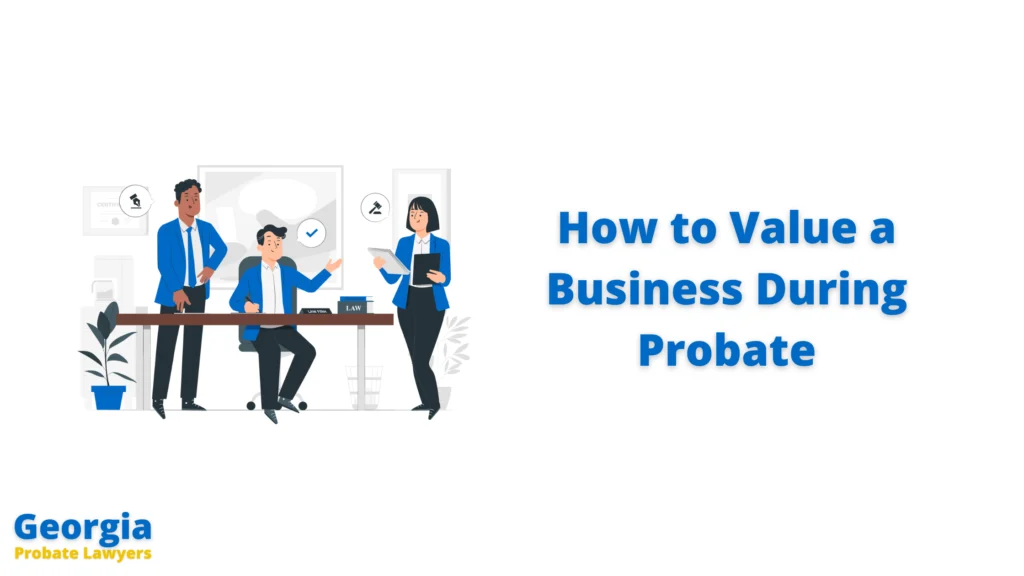
When someone passes away and leaves behind a business, figuring out what that business is worth becomes part of the probate process.
If you’re the one in charge, it can feel overwhelming—especially if you’re grieving or have never done anything like this before.
This guide walks you through how to value a business during probate in Georgia in plain English.
You’ll learn what steps to take, what documents to gather, and what to watch out for—so you don’t get stuck, make costly mistakes, or delay the estate.
Avoid the delays, expenses, and public exposure of probate.
Schedule your free, no-pressure Estate Planning Roadmap Call today.
"*" indicates required fields
This section explains what business valuation means and why Georgia probate courts require it.
Business valuation means figuring out how much a business is worth in dollars.
During probate, the court needs to know the full value of the estate—including any business the person owned—so it can:
If the business isn’t valued properly, the estate might be delayed, or heirs might end up fighting over it.
Getting this right keeps things fair and helps the estate move forward smoothly.
You can’t value a business without the paperwork. This step shows you what to collect.
Gather these documents:
Tip: Open a separate bank account for the estate. It keeps the records clean and makes court reporting much easier.
The way a business is set up affects how you value it and what part belongs in the estate.
Here are the common types of businesses:
Why it matters: You may only need to value the portion of the business the deceased person owned—not the entire business.
This step covers how the business gets a dollar value assigned to it.
Adds up everything the business owns, then subtracts debts.
Example:
Looks at how much the business makes. Then applies a multiplier based on the industry and risk.
Example:
Compares the business to similar businesses that recently sold.
Example:
A local dry cleaner sells for 2x annual earnings. If your dry cleaner earns $50,000 a year, it might be worth $100,000.
Tip: If the business has no profits or hasn’t operated in years, its value might be limited to just the equipment, supplies, or accounts it holds.
Sometimes, you need a professional to get an accurate value.
Hire a certified appraiser if:
Ask for a written appraisal report that explains how the appraiser came up with the value. You can give this to the court as proof.
Once you know the value, it must be reported properly to the probate court.
Report it on the:
Tip: Always keep a copy of the appraisal and paperwork. You may need to show it again if the court, heirs, or tax authorities ask for proof.
If the business is still running, someone has to handle it while probate is open.
What to do:
If the business can’t keep operating, you may need to close it down and sell off assets. The court can help guide this process.
Avoiding these issues helps keep you out of legal trouble and reduces delays.
Here are questions people ask us when trying to figure out how to probate real estate.
No. For small or inactive businesses, you might be able to use tax returns or a basic calculation.
But for larger estates, formal appraisals are safer and often required.
Only if you have legal authority—usually by being appointed as the executor or administrator.
The will or the court must give permission.
You only value the deceased’s share.
The partnership agreement might include rules for what happens at death.
It still might have value—like inventory, real estate, or brand name.
If it’s not worth continuing, you may need to close it and sell off assets.
Dealing with probate and trying to value a business on your own?
You don’t have to guess—or risk doing it wrong.
Book a free consultation with our Georgia probate team.
We’ll review your situation, explain exactly what needs to happen, and give you a clear plan—no pressure, no confusion.
👉 Fill out the form below to schedule your free call now.
Let’s take the weight off your shoulders.
Avoid the delays, expenses, and public exposure of probate.
Schedule your free, no-pressure Estate Planning Roadmap Call today.
"*" indicates required fields
Our Georgia probate lawyers work remotely, so you don’t have to visit an office. Here are all the counties we serve in Georgia.